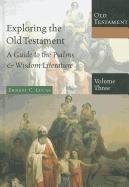Ernest Lucas provides a helpful introduction to the Wisdom literature of the Old Testament in this fine volume. It is, perhaps, the best of the four volumes that make up this series on Exploring the Old Testament. Together with the corresponding volumes covering the Pentateuch, the historical books, and the prophets, these books make for a solid Introduction the the whole Old Testament.
The strength of this volume is far and away the skill at which he describes the special elements of studying the Wisdom literature of the OT, particularly for those who might never have studied it before. He guides the student through poetry, parallelism, and how wisdom was used in ancient culture. He also spends a fair amount of ink explaining classifications of psalms. He provides a fine general introduction to each of the 5 books of Wisdom literature as well.
The only negative is too much respect was given at times to some scholars too far off the reservation. For example, in his fascinating review of psalm classification I wish he had considered more conservative scholars as well. Still, even that part was instructive. The psalms he chose to explain in depth could be argued if his premise was that they were the most important. For example, where were the Pilgrim Psalms? Overall, the strengths far outweigh the weaknesses.
I recommend this volume for your studies of the Wisdom literature of the OT.
I received this book free from the publisher. I was not required to write a positive review. The opinions I have expressed are my own. I am disclosing this in accordance with the Federal Trade Commission’s 16 CFR, Part 255

